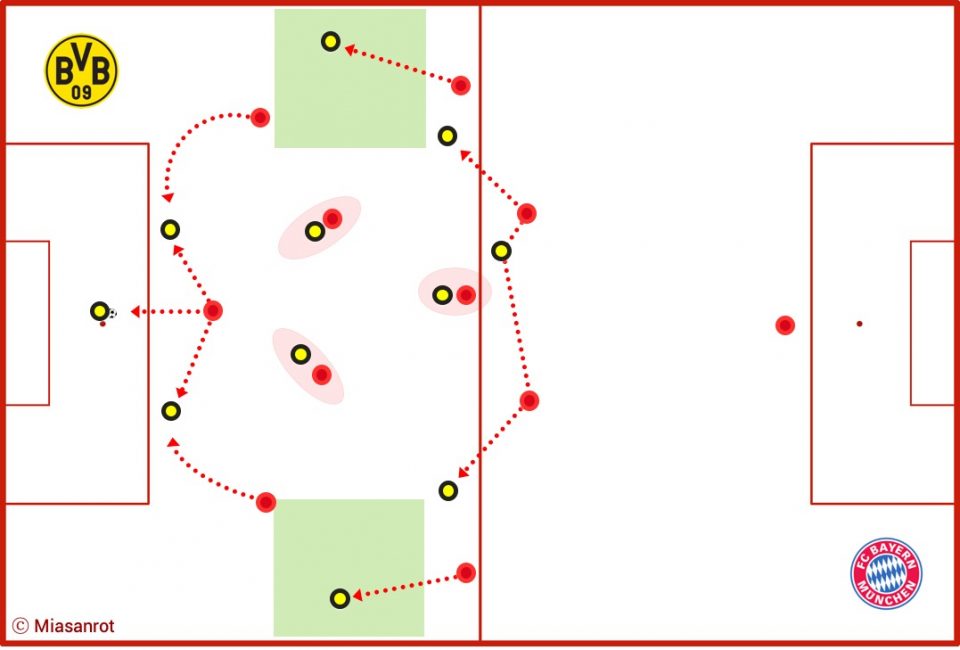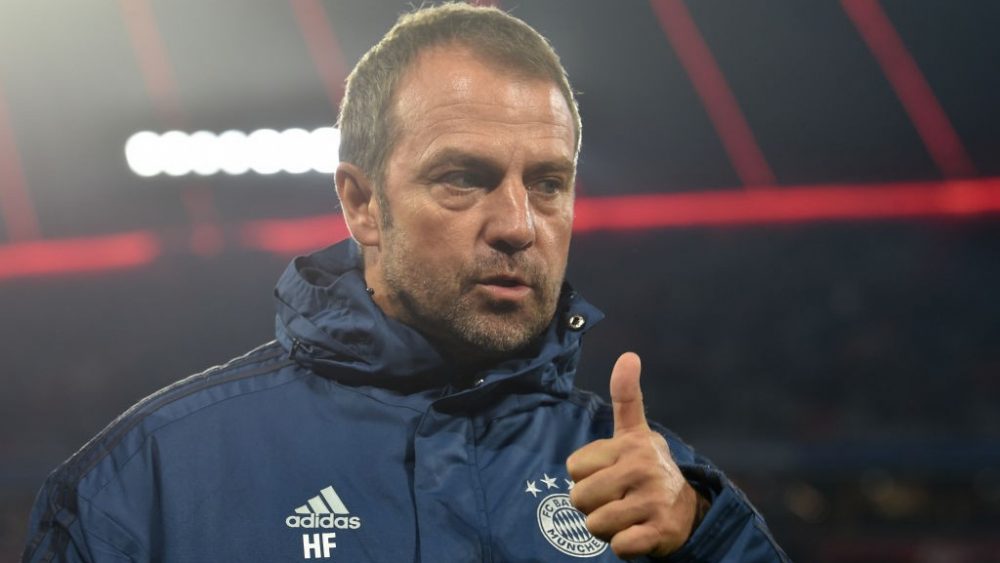Review: How Flick won the stunner against Dortmund
The match between Bayern and Dortmund has reached the 88th minute. As has been so often the case in recent years when Dortmund travel to Bayern, the outcome of the match is already certain: the record champion is a about to see their long-time rival off with a crushing scoreline.
But this is not the most remarkable thing about this 88th minute. Late substitute Ivan Perišić had just driven a volley shot slightly wide of Dortmund’s goal. The ball went marginally wide of the post. While the Croat is still annoyed and Roman Bürki is preparing for the goal kick, Thomas Müller spreads out his arms, turns his head from one teammate to the other and starts bellowing commands.
And his teammates listen to him. Five Bayern players swiftly move up and start blocking the Dortmund players to whom Bürki could pass the ball. As a result, Bürki has to resort to a long ball out, and his side swiftly loses possession to Bayern. What exactly is remarkable about that? The intensity with which Bayern still went about their business at a 4-0 lead shortly before the final whistle. The reason why this is so remarkable is because the reigning champion could rarely be observed doing this lately.
“Practicing tactics”: Flick is building a foundation
Earlier this week, Bayern made people perk up and take notice with a message on their official website. Hansi Flick had led a “tactical training session” Tactical? Which training is not tactical? After the game Joshua Kimmich gave further insights:
“We won the ball much higher a lot more often, so they didn’t find their way into the game. We had clear orders as to who would close down whom in pressing, and there were clear guidelines that we adhered to. Everyone knew what to do. And of course if you want to attack, it’s always easier to win back the ball early than wait till the opponent has come to your own penalty area because you don’t have to play over ten players again.” Joshua Kimmich on Bayern’s plan for the match.
This showed on the pitch. After an initial 15-minute phase of warming to the match, Bayern really got going with Robert Lewandowski’s opening goal. They won their duels, they moved cleverly and – this is the essential point Kimmich pointed out – they had a stable foundation that served as a springboard for everything the team did on the field. The great individual class of the players thus merged into a strong collective performance.
Half space frenzy: Dortmund crushed
Flick’s courage to start without his two most creative players, Thiago and Philippe Coutinho, paid off because Flick pursued a clear plan for the match to which Leon Goretzka and Thomas Müller were better suited: he put the focus on using the half-spaces – in possession, but especially against the ball. For this to work, he needed aggressive and hard working players on the two number eight positions. This was a shoe-in requirement for Thomas Müller because he has unique qualities in organising Bayern’s pressing in a way that only he can carry out in this form.

As a result, Dortmund’s build-up game was limited to what Bayern allowed. Lewandowski and the wingers always closed down the ball-carrying opponent in such a way that they were mostly left with three possibilities: playing the ball to the centre, chipping it out to the left, or chipping it out to the right.
In the middle of the pitch, Goretzka and Müller closely marked Dortmund’s holding midfielders. Kimmich also consistently pushed up aggressively. That Dortmund chipped the balls left and right allowed Bayern’s two number eights to have the crucial fraction of a second more time to shift out on the respective side, where they were further supported by Bayern’s offensive full-backs.
Across-the-board coverage
Bayern’s high intensity was the decisive factor. Bayern maintained a high pace from start to finish and always put Dortmund under enormous pressure. Only Mats Hummels seemed to be equal to the challenge, and he was one of the few players in yellow-black to play a strong game. Most of the time, Dortmund’s way to the final third led through him, especially in the early stages of the game. But all of Dortmund’s attacks were repelled by a strong Bayern defense.
Bayern’s game has not often lacked effort and willingness to run this season. The difference now is that this time they knew exactly where to run. This made a big difference. There were only a few situations where the players had to rely on their intuition. They had prepared a toolbox of ready-made solutions for a variety of problems and knew how to apply them during the game. In addition, Javi Martínez in particular had an outstanding day. The whole back four would deserve a special mention, but Martinez delivered a performance that was truly reminiscent of his best days.
However, the fact that there was rarely one Bayern player forced to defend a situation all by himself was due to the whole team maintaining a compact shape throughout the game. Even when Dortmund managed one of their few clever switches of the play, two or more Bayern players quickly closed in on the ball. Kimmich spoke of a successful “across-the-board coverage”. Dortmund simply did not find a solution. Even if Bayern did not have the ball, they were the team that controlled the game. Because they acted and Dortmund was permanently on the back foot.
Defense as a means of offense
And this is the big difference to the season so far. One of the many complex reasons why Niko Kovač failed was that he approached the game focusing on defense first. If you listen to Flick, you could suppose he did the same thing. He has stressed several times that his first order of the day was to stabilize the defense.
But Flick does not seem to understand the defense as an isolated entity. His approach and statements indicate that he sees it merely as the basis for a dominant and controlled possession game. “Forward defending” in order to get the ball.
Quick recoveries, not letting the opponent find a way into the game, and always keeping calm in possession. Recently, Bayern has often conceded counter attacks because they took every chance they could to attempt even a risky vertical pass. Against Dortmund, however, they also chose the safe pass back at times, although one of the two number eights offered themselves further up front.
Control instead of harakiri
Bayern’s top priority always was to control the game in possession. With a much more compact shape close to the ball, Bayern managed to resolve tight situations, switch the play occasionally, and keep Dortmund moving.
Dortmund may have defended passively and anxiously, but Bayern’s performance played a huge part in the fact that they looked so frighteningly poor. Bayern’s good performance should not be diminished by the weaknesses of the opponent in this case. They found a perfect balance between pressure and speed on the one hand and calm and control on the other.
If you were to look for the fly in the ointment, you might point out that this particular fixture is one of those over the course of a season where the specialty of the occasion itself is enough to motivate the players to muster their best performances.
Now it is about continuity
And there is something to this argument. If you take a look at the past stunners in the Allianz Arena, you know that each Bayern coach has approached the game in his own particular way. However, whatever the approach, it has always been enough to achieve high victories. Often these victories had such an exceptional character that the performances had no indicative character for the remainder of the season.
This is the challenge that Flick, who, according to Karl-Heinz Rummenigge, will continue as head coach “until further notice”, now faces. He must establish continuity. He has to make sure that his team can consistently repeat the control in possession and the pressure in moving forward they showed in this match for the rest of the season.
If he manages to do so, there is a good chance that Bayern will continue to make progress and be successful in the coming weeks. The 4-0 victory was an initial statement. It sets the bar for the rest of the season. And it proves: If this team has a tactical and strategic framework, it can achieve great things. The players, who had only had good things to say about Flick, now seem to believe in him even more. What he makes out of this situation will be a crucial factor in the decision about his future as head coach. In the coming weeks, he will also have to successfully involve the players into his plans that he left on the bench for the game against Dortmund. Loosely drawing on Mehmet Scholl: finally the players were put on the tactical shackles again.





